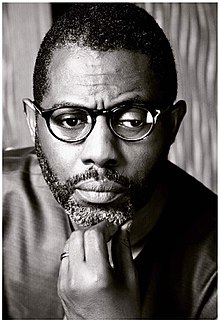Femi Odugbemi
Femi Odugbemi (born 1963) is a Nigerian documentary filmmaker, Screenwriter, cinematographer, director, producer and photographer.[1][2][3]
Femi Odugbemi | |
|---|---|
 | |
| Born | 1963 |
| Nationality | Nigerian |
| Citizenship | Nigerian |
| Occupation |
|
Notable work | "Tinsel" (TV series,2008)'"Mama Put"(TV Movie, 2005) "Maroko"(feature film,2006) "Gidi Blues"(Feature film, 2016) "And the Chain was Not" (Documentary,2010) "ORIKI"(Documentary,2008) "Battleground"(TV drama, 2017) "The Eve"(Feature film, 2017) and "4th Estate"(Feature film, 2018) "Missing Pages"(Feature film 2018) "CODE WILO"(Feature film 2019) |
| Awards | Fellow of Theatre Arts, National Association of Nigerian Theatre Arts Practitioners(NANTAP) 2013 Excellence Award in Film by the Society for the Performing Arts in Nigeria(SPAN). Nigerian Film Corporation Lifetime Achievement Award. |
| Website | www.zuri24media.com |
Career
Odugbemi was born in Lagos State, south western Nigeria.[4]
He attended Montana State University where he studied film and television production. After graduating, he worked briefly at the Nigeria Television Authority and later as film and radio producer at Lintas Advertising and McCann-Erickson.
He has scripted, directed and produced documentaries, short films and drama.[5] He produced Tinsel, a Nigerian soap opera that began airing in August 2008 acclaimed "the most successful television drama on Nigerian television in recent times" in 2013.[6] He has cemented his reputation as one of the top TV drama Producers in Africa with his year 2018 TV series BATTLEGROUND which drew massive viewership across the continent with over 400 episodes.
Odugbemi scripted, directed and produced Bariga Boys, a multiple award-winning Nigerian documentary about street performers in Bariga, Lagos.[7]
In 2013, he scripted, produced and directed a documentary titled, Literature, Language and Literalism about the late Nigerian writer, Daniel O. Fagunwa, the author of Ògbójú Ọdẹ nínú Igbó Irúnmalẹ̀.[8]
In 2002, he became the President of the Independent Television Producers Association of Nigeria, a tenure that ended in 2006.[9] He is a member of the Advisory Board of the School of Media and Communications, Pan-African University, a postgraduate training university.[10]
In 2008, he produced Abobaku, a short film directed by Niji Akanni.[11] The film won the Most Outstanding Short Film at the Zuma Film Festival held in 2010 and Best Costume at the 6th Africa Movie Academy Awards as held on 10 April 2010 at the Gloryland Cultural Center in Yenagoa, Bayelsa State, Nigeria.[12]
In March 2010 he Co-founded the IREPRESENT International Documentary Film Festival Lagos which has pursued with vigour its theme of “Africa in self-conversation” by championing films and stories from Africa, about Africa and by Africans.
On June 26, 2018, he received a formal invitation to become a voting member of The Academy of Motion Picture Arts and Sciences in the United States.[13]
The Nigeria Film Corporation in November 2018 also awarded Femi Odugbemi the prestigious ROCK OF FAME Lifetime Achievement award.
See also
References
- Krings, M.; Okome, O. (2013). Global Nollywood: The Transnational Dimensions of an African Video Film Industry. Indiana University Press. p. 44. ISBN 9780253009425. Retrieved 2015-04-12.
- "Making documentary films relevant in a digital age". tribune.com.ng. Archived from the original on 2015-04-12. Retrieved 2015-04-12.
- "iREP 2014 explores rhythms of identity". tribune.com.ng. Archived from the original on 2015-04-12. Retrieved 2015-04-12.
- "In Kampala, Odugbemi meets Ozokwor". punchng.com. Archived from the original on 2015-04-12. Retrieved 2015-04-12.
- Ekenyerengozi, M.C. (2013). NOLLYWOOD MIRROR®. LULU Press. p. 41. ISBN 9781304729538. Retrieved 2015-04-12.
- "Tinsel, a return to the golden age of TV drama - Entertainment". dailyindependentnig.com. Archived from the original on 2013-10-11. Retrieved 2015-04-12.
- "Hidden wealth in documentary films". punchng.com. Archived from the original on 2015-04-12. Retrieved 2015-04-12.
- "Candid lens on a legendary writer". punchng.com. Archived from the original on 2015-04-12. Retrieved 2015-04-12.
- Parekh, B. (2008). A New Politics of Identity: Political Principles for an Interdependent World. Palgrave Macmillan. p. 197. ISBN 9781137050700. Retrieved 2015-04-12.
- "Africultures - Biographie de Fémi Odugbemi". africultures.com. Retrieved 2015-04-12.
- "Africultures - Fiche film : Abobaku". africultures.com. Retrieved 2015-04-12.
- "AMAA 2010: 280 films entered, as Ghana hosts nomination party - Vanguard News". vanguardngr.com. Retrieved 2015-04-12.
- "Nigeria's Femi Odugbemi becomes member of Oscars voting academy – Punch Newspapers". punchng-com.cdn.ampproject.org. Retrieved 2018-06-26.